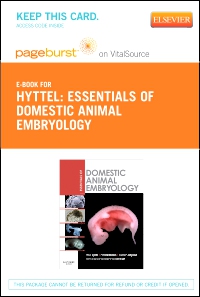
Essentials of Domestic Animal Embryology - Elsevier eBook on VitalSource (Retail Access Card), 1st Edition
Elsevier eBook on VitalSource - Access Card

$84.99
Essentials of Domestic Animal Embryology is a comprehensive, modern treatment of the subject dealing with all organ systems and including important molecular aspects of animal development. Written with the student in mind, the text covers embryology of the domestic species, both general (development from formation of the gametes, through fertilization and initial embryogenesis, up to organ formation) and special (development of the organ systems). It also includes sections on teratology, assisted reproduction technologies, societal relevance, and the implications for current veterinary practice of a long-established science.
Students of veterinary medicine, animal science, biomedical sciences and biotechnology, at both undergraduate and graduate stages of their careers, will find this volume essential for their needs. The international experience of the authors has been applied to produce a textbook of international relevance, likely to remain an important resource for many years to come.
-
- Succinct and accessible
- 300 high-quality colour illustrations
- Written for undergraduates and invaluable for graduates wishing to brush up
-
CONTENTS
INTRODUCTION & GENERAL PRINCIPLES
1 Cellular and Molecular Mechanisms of Morphogenesis
• Cell proliferation: Cell cycle, differentiation, regulation
• Cell demise: Apoptosis
• Cytoskeleton/Extracellular Matrix/Cell-Matrix interactions
• Morphogenesis & Patterning
2 Comparative Gestation
• Distinctions of the Early Embryo, Embryonic and Fetal Periods of Gestation
• Species Variations Effecting Gestation Length: Companion, Domestic, Wildlife and Laboratory Animals
• Reproductive Cycles: Hormones, Estrous, Organs, Seasonal
• Fecundity: Survival Strategies, Conception Rates
DIFFERENTIATION OF GERM LAYERS
3. Gametogenesis
• Mitosis/Meiosis
• Oogenesis
• Spermatogenesis
• Veterinary Clinical Applications/Cases
4. Fertilization
• Acrosome Reaction
• Sperm-Zona Pellucida Interactions
• Gamete Fusion
• Blocks to Polyspermy
• Syngamy and Embryo Activation
• Veterinary Clinical Applications/Cases
5. Embryo Cleavage and Blastulation
• Polarity, Compaction and Cavitation
• Embryonic Disc, Primitive Streak and Formation of the Bilaminar Embryo
• Veterinary Clinical Applications/Cases
6. Gastrulation, Body Folding and Coelom Formation
• Notocord, Neural Tube and Segmentation
• Differentiation of Ectoderm, Mesoderm and Endoderm
• Body Folding, Coelom Formation and Lung Development
• Veterinary Clinical Applications/Cases
7. Development of the Peripheral Nervous System
• Spinal Cord and Motor/Sensory Innervation
• Somite Development
8. Comparative Placentation
• Extraembryonic Membranes: Amnion, Yolk Sac, Allantois, Chorion
• Placental Strategies: Choriovitelline, Chorioallantoic
• Species Variations
• Veterinary Clinical Applications/Cases
SYSTEMS DEVELOPMENT
9. Development of the Limbs
• Limb Bud Formation
• Apical Ectodermal Ridge
• Development of the Appendicular Skeleton, Musculature, Vasculature and Innervation
• Differentiation of Distal Appendages: Digit Formation
• Veterinary Clinical Applications/Cases
10. Development of the Heart
• Primitive Heart Tube Formation
• Development of Heart Chambers and Valves
• Development of the Conduction System
• Veterinary Clinical Applications/Cases
11. Development of the Vascular System
• Formation of the Aortic Arches and the Arterial System
• Development of the Vitelline, Umbilical and Cardinal Venous System
• The Coronary Vasculature
• Circulatory changes at Parturition
• Veterinary Clinical Applications/Cases
12. Development of the Gastrointestinal System
• The Enteric Canal
• Stomach, Pancreas, Liver and Spleen
• Development of Peritoneum and Formation of Mesenteries
• Rotation and Fixation of the Midgut
• Differentiation of the Large Bowel
• Septation and Differentiation of the Cloaca
• Veterinary Clinical Applications/Cases
13. Development of the Urogenital System
• Pronephros Differentiation
• Development of the Mesonephric and Metanephric Kidneys
• Urogenital Ridge and Gonad Development
• Development of the Urogentital Duct Systems and External Genitalia
• Veterinary Clinical Applications/Cases
14. Development of the Head and Neck
• Development of the Skull and Vertebrae
• Differentiation of Pharyngeal Arch Structures and Pouch Derivatives
• Development of the Palate, Tongue and Pituitary
• Development of Facial Structures
• Veterinary Clinical Applications/Cases
15. Development of the Brain and Cranial Nerves
• Regional Differentiation and Functional Relationships
• Development of the Ventricular System
• Development and Function of the Cranial Nerves
• Veterinary Clinical Applications/Cases
16. Development of the Eyes and Ears
• Formation of the Ear
• Formation of the Eye
• Veterinary Clinical Applications/Cases
17. Development of the Integumentary System
• Differentiation of the Epidermis and Dermis
• Development of Epidermal Glands including Mammary Glands
• Formation of Hair and Teeth
• Veterinary Clinical Applications/Cases
CLINICAL AND APPLIED SYSTEMS
18. Teratology
• Genetic & Congenital
• Critical Periods & Teratogenic Agents
• Maternal/Fetal Interactions
• Specie-Specific Manifestations
19. Assisted Reproductive Technologies
• Artificial Insemination and Embryo/Gamete Transfer (ET,GIFT, ZIFT, etc)
• Cryopreservation of Germplasm
• In Vitro Maturation, Fertilization and Embryo Production
• Embryo Micromanipulation: Splitting, ICSI, Transgenics, Embryonic Stem Cells/ Chimeras, Cloning
20. Applied Embryology: Veterinary and Societal Issues
• The Role of the Veterinarian
• Contemporary Issues
Additional Reading - References
Glossary
Index